The integration of a gluten-free approach with the Mediterranean diet presents a unique fusion aimed at individuals seeking to improve their health while managing gluten sensitivities or celiac disease. The Mediterranean diet is renowned for its emphasis on whole grains, fruits, vegetables, legumes, healthy fats, and a moderate intake of dairy and fish, which collectively offer protective benefits against heart disease, cancer, and various chronic conditions. When adapted to a gluten-free framework, this diet maintains its health-promoting properties while eliminating all sources of gluten, which are harmful for those with celiac disease.
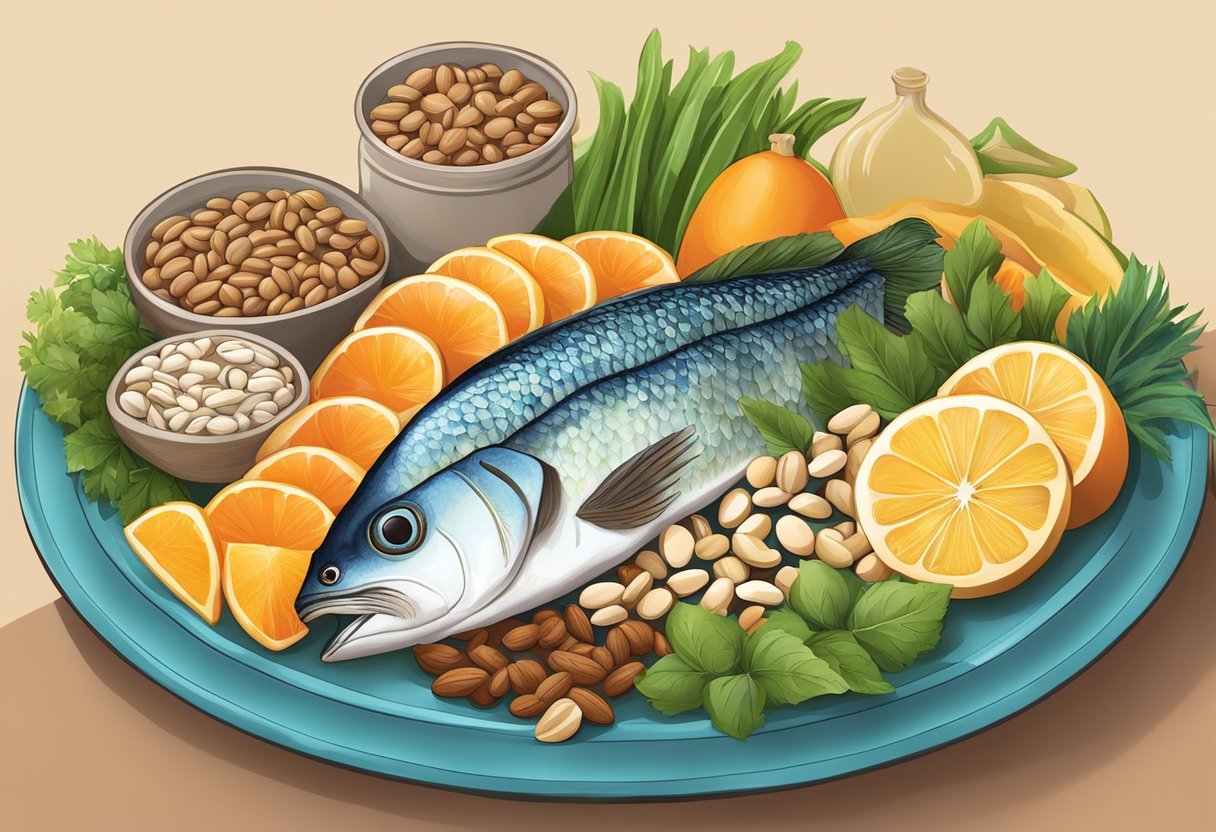
Adhering to this gluten-free Mediterranean diet involves careful selection of gluten-free whole grains and alternatives to ensure dietary balance and full nutrient intake. It also focuses on the importance of incorporating a variety of proteins, such as legumes, nuts, seeds, and lean meats, which are naturally gluten-free and align with Mediterranean dietary patterns. Nutritionists and registered dietitians can provide valuable advice to craft a meal plan that embraces the anti-inflammatory and health-benefiting principles of both diets, potentially aiding in weight loss, diabetes management, and improving overall health without risking gluten exposure.
Key Takeaways
- The gluten-free Mediterranean diet is beneficial for managing gluten sensitivities and improving overall health.
- It is crucial to choose gluten-free whole grains and lean proteins within this dietary framework.
- Guidance from healthcare professionals is recommended to tailor the diet to individual health needs.
Table of Contents
Understanding Proteins in the Gluten-Free Mediterranean Diet
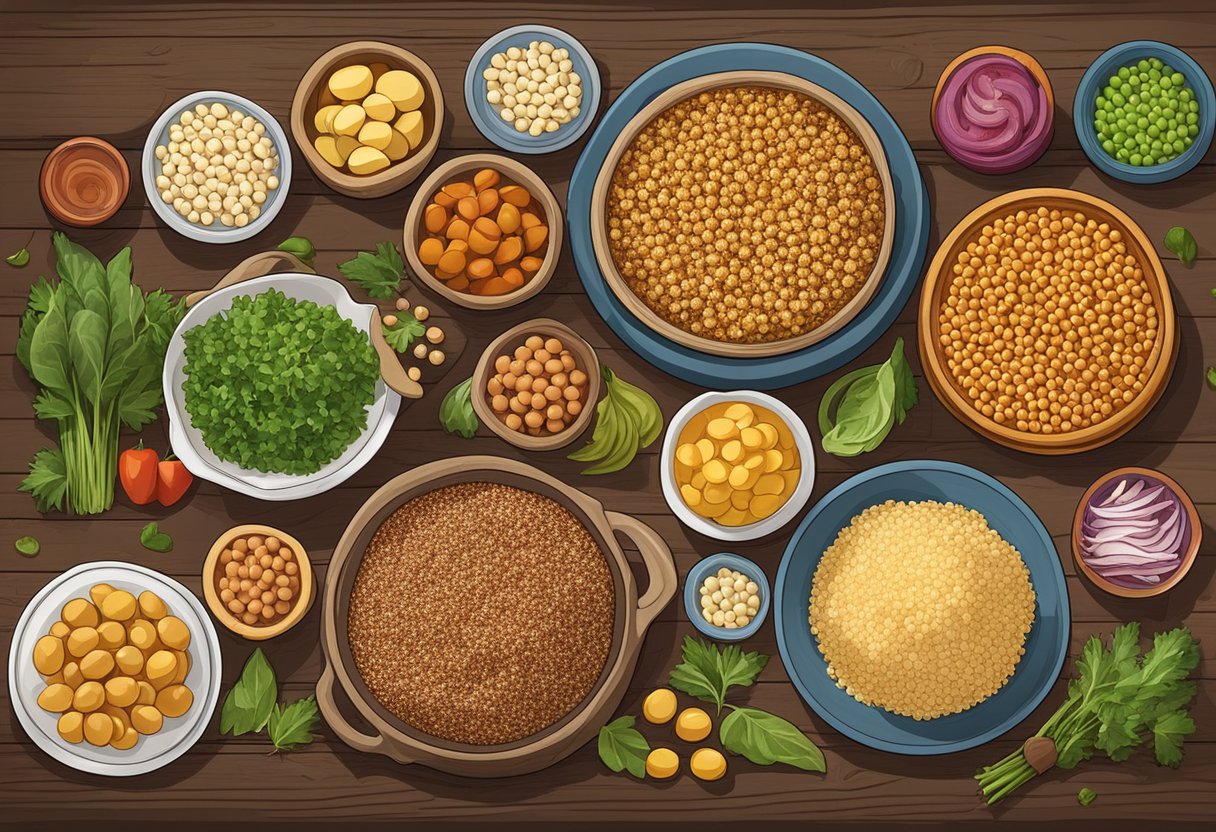
Protein plays a pivotal role in the gluten-free Mediterranean diet, providing essential building blocks for the body’s functions. The diet emphasizes protein sources that are naturally gluten-free, ensuring good health and meeting dietary needs.
The Role of Proteins
Proteins are crucial for the maintenance and repair of body tissues. In the context of a gluten-free Mediterranean diet, they contribute to satiety, muscle health, and overall wellness. This diet includes a focus on proteins from both animal and plant-based sources, lending to a balanced intake that supports an anti-inflammatory lifestyle.
Gluten-Free Protein Sources
Legumes such as lentils and chickpeas serve as excellent gluten-free protein options, offering a wealth of nutrients beyond just protein, including fiber and antioxidants. Nuts and seeds, including almonds and flaxseeds, provide healthy fats along with their protein content. For non-vegetarian options, poultry like chicken and a variety of fish, such as salmon, offer high-quality protein and a rich supply of omega-3 fatty acids.
- Vegetables: Some, like spinach and kale, contain protein, albeit in lower amounts than other sources.
- Salmon: A top-notch choice for the diet, rich in protein and anti-inflammatory omega-3 fatty acids.
Those following this diet should consult a nutritionist to ensure their protein needs are met while maintaining gluten-free guidelines.
Benefits of Protein in the Diet
Including adequate protein in the diet aids in sustaining a healthy metabolism and supports the immune system. On a gluten-free Mediterranean diet, the inclusion of diverse protein sources helps to minimize the risk of inflammation and chronic disease by ensuring intake of essential amino acids and nutrients needed for the body’s optimal functioning.
Gluten-Free Grains and Alternatives
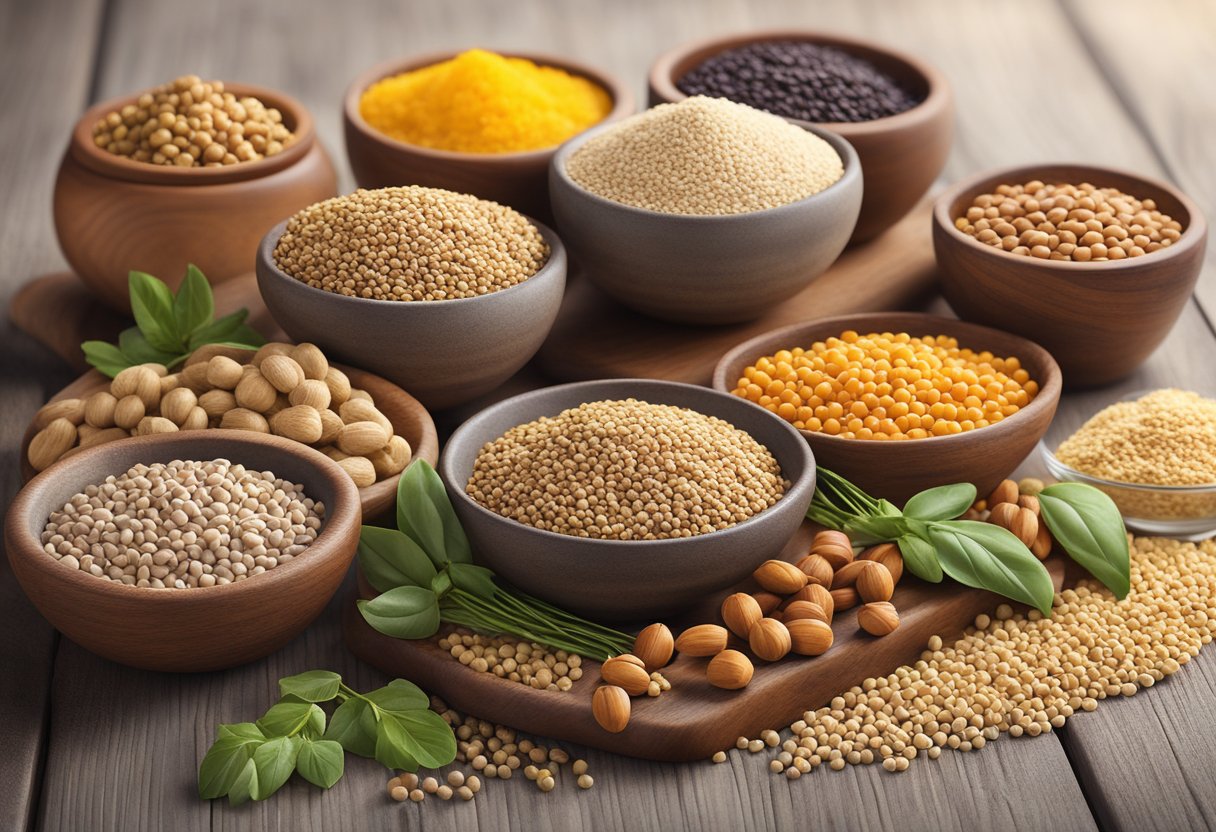
In the context of a Mediterranean diet adapted for individuals with celiac disease or gluten sensitivity, certain grains and alternatives play a pivotal role in maintaining nutritional balance. These options provide essential nutrients and fiber without the adverse effects of gluten.
Safe Gluten-Free Grains
The cornerstone of a gluten-free diet is the inclusion of grains that naturally don’t contain gluten. These whole grains are not just safe for individuals with celiac disease; they’re packed with nutrients and are integral in a Mediterranean-style diet. Grains such as rice, buckwheat, and corn are all gluten-free and can be enjoyed in a variety of dishes, providing the body with a source of energy and fiber. Additionally, while oats are inherently gluten-free, they’re often cross-contaminated with gluten-containing grains during processing. Therefore, one should always opt for oats that are specifically labeled as gluten-free to avoid any risks.
Quinoa and Other Alternatives
Quinoa stands out as a gluten-free powerhouse among grain alternatives. As a complete protein source, quinoa offers all nine essential amino acids, making it particularly valuable for those following a gluten-free Mediterranean diet. Its versatility allows it to be incorporated into recipes as a nutritious substitute for gluten-containing grains. Other alternatives include grain-like seeds such as amaranth and teff, which contribute not only variety but also additional nutrients and fiber to the diet. These alternatives present a wealth of options for those looking to maintain a gluten-free diet while reaping the benefits of a Mediterranean dietary pattern.
Incorporating Vegetables and Fruits

Incorporating a variety of vegetables and fruits is crucial for adhering to a gluten-free Mediterranean diet. These plant-based foods provide essential fiber, vitamins, and antioxidants that support overall health.
Recommended Vegetables
In the gluten-free Mediterranean diet, vegetables are not just accouterments but central components of every meal. Key vegetables include:
- Leafy Greens: Such as spinach and kale, which are rich in iron and calcium.
- Cruciferous Vegetables: Broccoli and cauliflower offer high levels of vitamins C and K.
- Root Vegetables: Carrots and sweet potatoes are excellent sources of vitamin A and other essential nutrients.
- Alliums: Onions and garlic enhance flavors while contributing to cardiovascular health.
- Nightshades: Eggplant and tomatoes, full of fiber and antioxidants.
Vegetables should be prepared with healthy fats like olive oil to enhance the absorption of fat-soluble vitamins.
Fruit Selection for a Balanced Diet
Fruits play a pivotal role in the gluten-free Mediterranean diet, contributing natural sweetness and an array of health benefits:
- Berries: Strawberries, blueberries, and raspberries are low in sugar and high in antioxidants.
- Citrus Fruits: Lemon, orange, and grapefruits provide vitamin C and flavonoids.
- Stone Fruits: Peaches and apricots are tasty and nutrient-dense options.
- Tropical Fruits: Pineapple and mango offer unique enzymes and vitamins.
Incorporating avocado, with its healthy fats and fiber, contributes to satiety and heart health. It’s recommended to consume a diverse range of fruits to benefit from the different vitamins and minerals they offer.
Optimizing Dairy and Legumes in Your Diet

Incorporating high-protein dairy such as Greek yogurt and feta cheese, along with legumes including lentils, chickpeas, and beans is essential for a balanced gluten-free Mediterranean diet. These foods provide not only protein but also vital nutrients such as calcium and probiotics.
Dairy Alternatives
For those on a gluten-free Mediterranean diet, finding dairy alternatives that also provide adequate calcium and probiotics is key. Greek yogurt is an excellent choice, naturally gluten-free and rich in probiotics, which support digestive health. One can also opt for dairy alternatives like almond or coconut-based yogurts, which can be fortified with calcium.
- Greek yogurt: a good source of protein and probiotics
- Cheese: opt for varieties like feta cheese, which is traditionally gluten-free
Legumes as Protein and Fiber Sources
Legumes are a cornerstone of the gluten-free Mediterranean diet, offering plentiful protein and fiber. They serve as an excellent plant-based protein source.
- Lentils: provide protein and iron
- Chickpeas and hummus: versatile options for dips or spreads
- Beans and soy: can be incorporated into a variety of dishes as a main protein
Healthy Fats and Oils
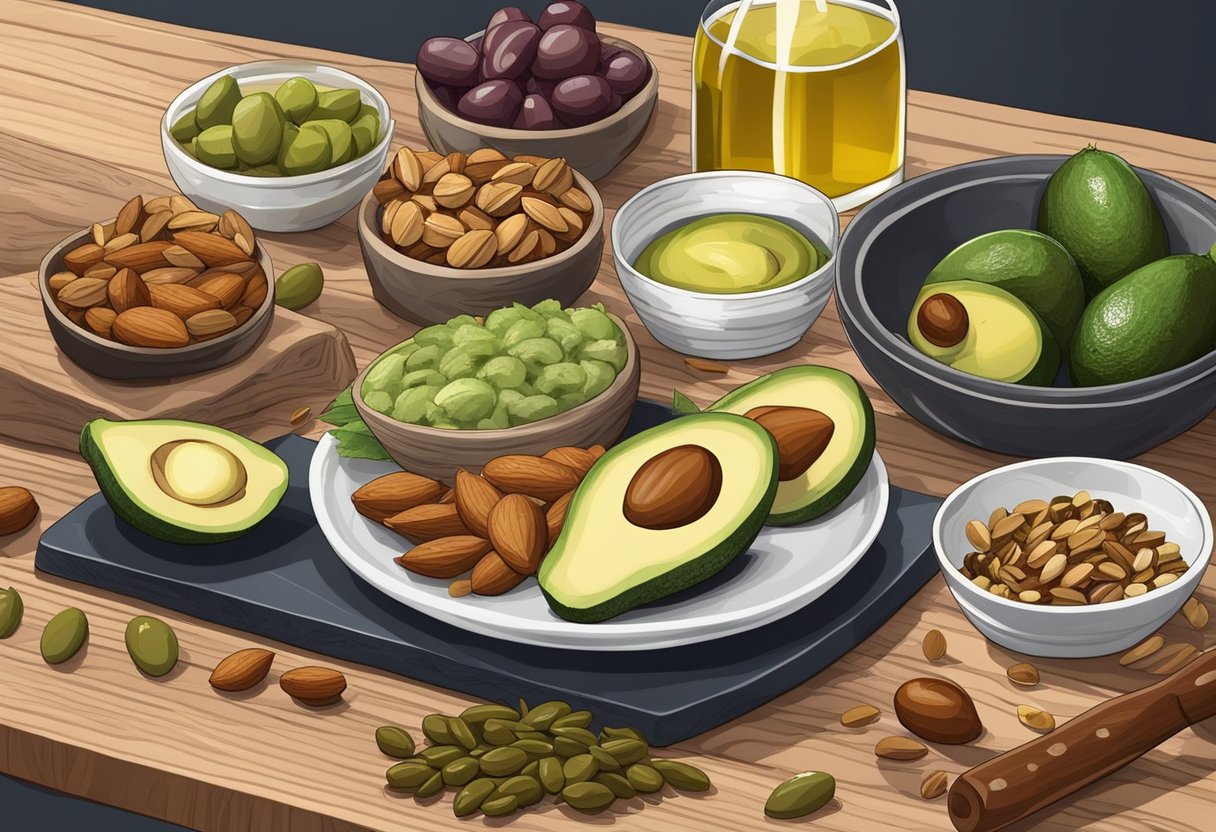
Incorporating healthy fats into a gluten-free Mediterranean diet is crucial for maintaining overall health and achieving the anti-inflammatory benefits the diet is known for. These fats are typically sourced from olive oil, nuts, seeds, and avocado, all of which are rich in omega-3 fatty acids.
Olive Oil and Other Healthy Fats
Olive oil stands as a pillar of the gluten-free Mediterranean diet, revered not only for its flavor but also for its health benefits. It’s a monounsaturated fat, high in oleic acid, which has been associated with reducing inflammation and offering cardio-protective properties. Individuals are encouraged to use olive oil liberally for cooking and dressings to reap the benefits of its high antioxidant content.
Seeds and Nuts
Seeds and nuts are essential to this diet as they provide a rich source of omega-3 fatty acids, fiber, and protein, all while being naturally gluten-free. Regular consumption of a variety of seeds such as chia, flax, and pumpkin seeds, alongside nuts like almonds, walnuts, and pistachios, can support heart health and reduce inflammation. They can be easily incorporated into meals as snacks, in salads, or as a component of entrees, making them versatile ingredients in a gluten-free Mediterranean kitchen.
Mediterranean Diet Meal Planning
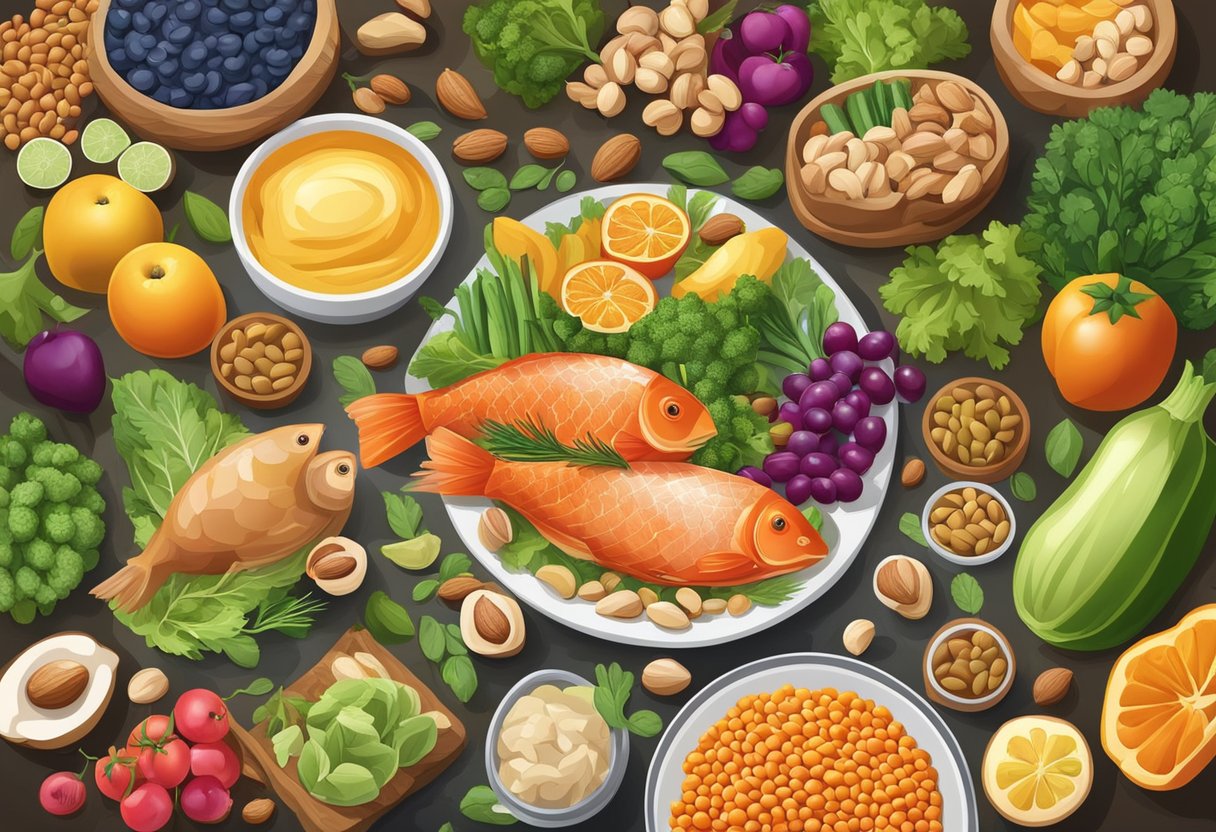
Crafting a Mediterranean meal plan that is both gluten-free and nutritious requires thoughtful selection of ingredients. Here are the steps to take and some meal ideas to get started.
Building a Gluten-Free Mediterranean Meal Plan
When building a gluten-free Mediterranean meal plan, one should focus on naturally gluten-free foods typical of the Mediterranean diet such as fruits, vegetables, legumes, nuts, seeds, fish, and lean meats. It is essential to create a shopping list that includes these fresh, unprocessed foods while avoiding gluten-containing grains like wheat, barley, and rye.
- Fruits and Vegetables: Base meals around a variety of colorful produce.
- Lean Proteins: Include options like chicken, salmon, and other poultry and fish.
- Plant-based Foods: Incorporate legumes and other vegetarian proteins.
- Healthy Fats: Use extra virgin olive oil for cooking and salad dressings.
- Gluten-Free Grains: Choose grains such as quinoa, rice, and certified gluten-free oats.
A comprehensive grocery list will ensure all necessary items for the week’s meals are purchased, reducing the need for last-minute shopping trips.
Sample Breakfast, Lunch, and Dinner Ideas
Breakfast options in a gluten-free Mediterranean diet might include:
- Greek yogurt with honey, almonds, and a serving of fruit.
- A quinoa salad topped with fresh berries and a drizzle of honey.
For lunch, one might enjoy:
- Grilled chicken or salmon salad with a variety of greens, avocado, and a lemon-olive oil dressing.
- A gluten-free wrap filled with hummus, grilled vegetables, and lean proteins like turkey or chicken.
Come dinner time, options can be both rich in flavor and nutrition:
- Salmon or other fish, grilled with herbs and served with a side of roasted Mediterranean vegetables.
- Stuffed bell peppers with quinoa, ground turkey, tomatoes, and herbs.
Snacks can include small portions of nuts, seeds, fruits, or even a simple cheese plate with a variety of cheeses and some olives.
Each meal incorporates a balance of nutrients, emphasizing vegetables and lean proteins, while paying close attention to gluten-free requirements. Incorporating a variety of recipes and flavors keeps the meal plan interesting and enjoyable.
Additional Considerations for a Gluten-Free Mediterranean Diet
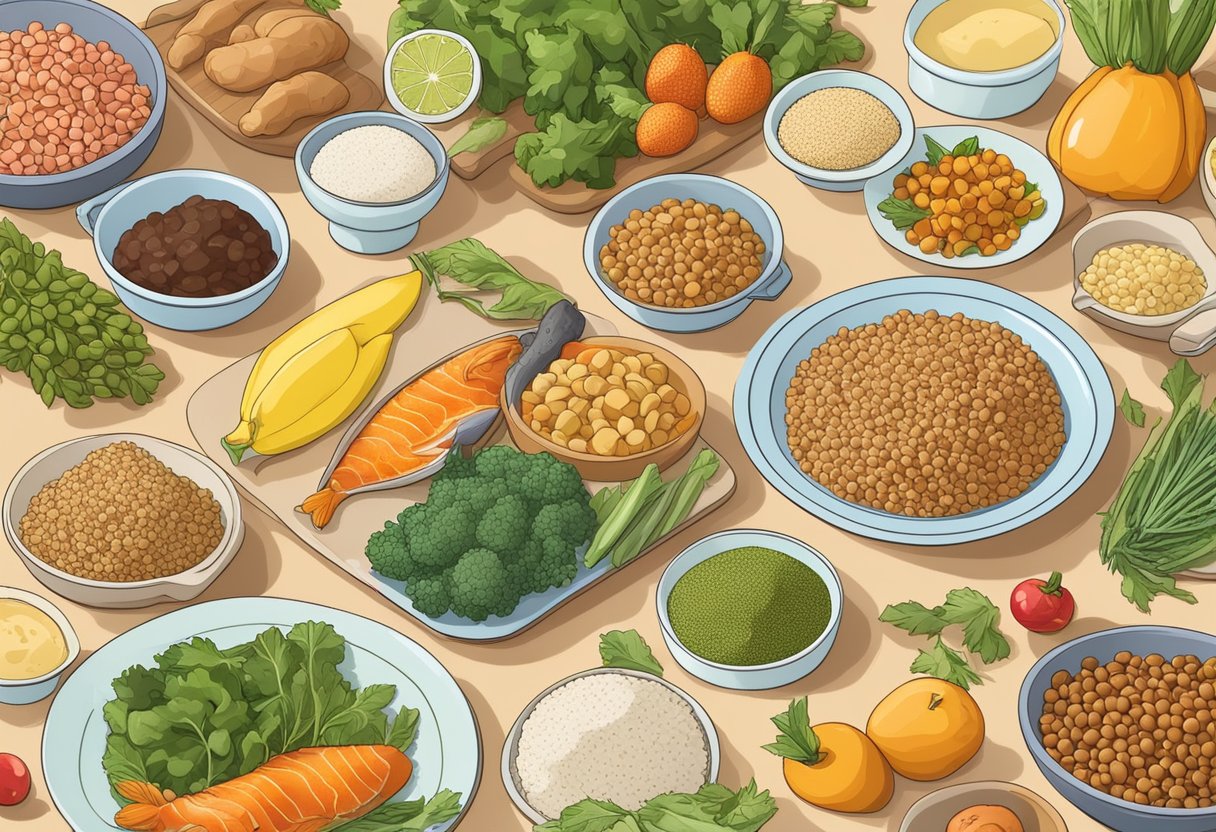
Adopting a gluten-free Mediterranean diet involves more than just food choices; one must consider the social and lifestyle implications to maintain overall health. Individuals living with celiac disease or adhering to a gluten-free diet can navigate these challenges effectively.
Navigating Social Situations and Dining Out
When dining out or attending social events, individuals with celiac disease must be vigilant about their dietary restrictions. It’s imperative to communicate clearly with restaurant staff about the necessity of a gluten-free meal. Many Mediterranean dishes use common gluten-containing ingredients like wheat in pastas and bread. However, alternatives such as quinoa or gluten-free pasta can be requested. Additionally, patrons should inquire about cross-contamination in the kitchen to ensure their meal is prepared safely. Selecting naturally gluten-free options, like grilled fish seasoned with spices and herbs, such as oregano, can also make dining out less stressful.
For those concerned about alcohol, it’s worth noting that most wine, including red wine, is naturally gluten-free. Nevertheless, it’s always prudent to verify, as some winemaking processes might introduce gluten-containing elements.
Creating a Sustainable and Enjoyable Dietary Routine
To ensure a sustainable approach to the gluten-free Mediterranean diet, individuals can focus on incorporating diverse, naturally gluten-free foods. Regular consumption of vegetables, fruits, legumes, and healthy fats like olive oil contributes to robust nutrition profiles. Sweet potatoes serve as a nutritious starch alternative to grains, can be prepared in various ways, and complement many dishes.
Hydration is also an essential facet of the diet, where water is the beverage of preference, keeping with Mediterranean lifestyle choices. For tailored guidance, a nutritionist adept in celiac disease management can offer personalized medical advice to align the diet with health objectives. The Celiac Disease Foundation provides additional resources to facilitate this dietary shift, ensuring both nutrition and pleasure from meals are maintained.
Frequently Asked Questions
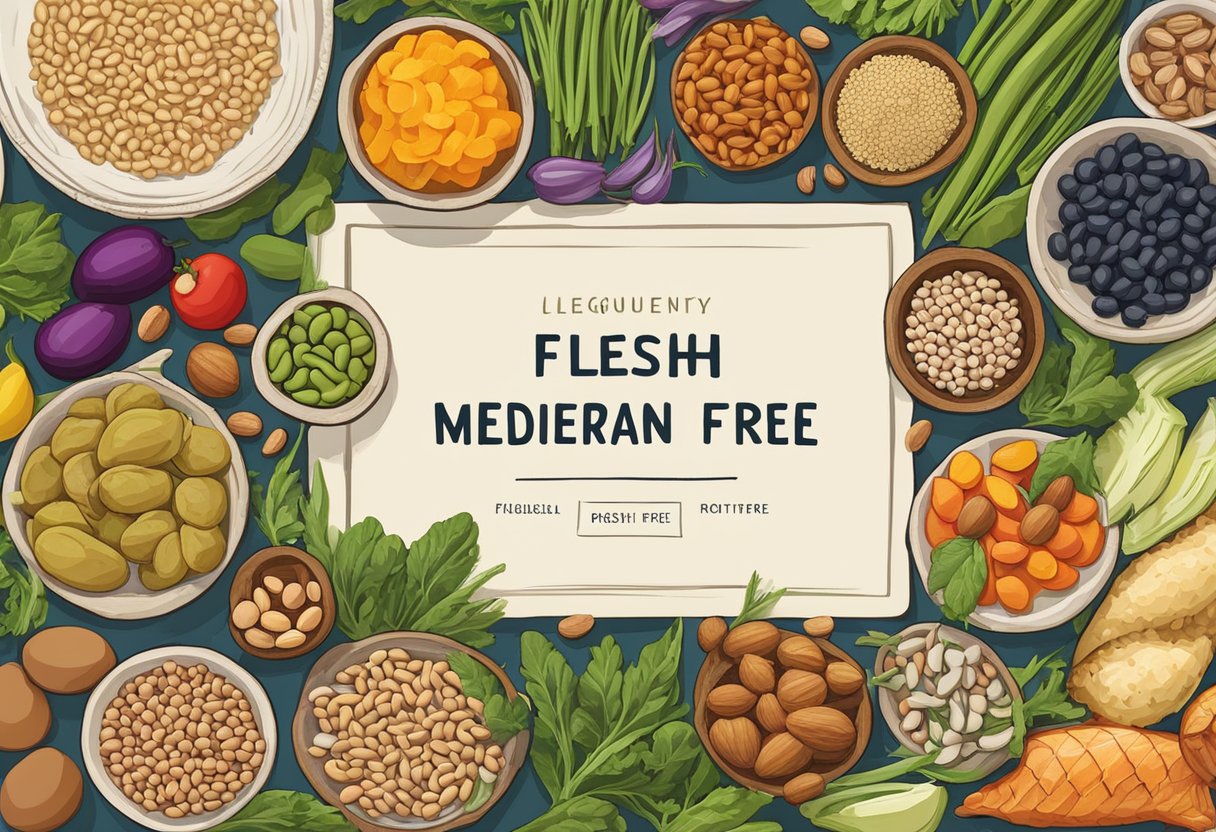
The gluten-free Mediterranean diet combines the heart-healthy principles of the traditional Mediterranean diet with gluten-free requirements. This section addresses common inquiries about protein sources, meal planning, recipes, shopping lists, cookbooks, and dining options, tailored for those following a gluten-free Mediterranean diet.
What are some protein-rich foods permissible on a gluten-free Mediterranean diet?
Protein-rich foods that fit into a gluten-free Mediterranean diet include fish, poultry, legumes such as lentils and chickpeas, nuts, and seeds. People can enjoy a high intake of these proteins while also adhering to a gluten-free lifestyle. For example, legumes are a staple in Mediterranean cuisine and provide ample protein.
Can you suggest gluten-free meal plan options for a Mediterranean diet?
Gluten-free meal plan options typically consist of meals based on vegetables, fruits, legumes, and seafood. Breakfast could be a hearty oatmeal using gluten-free oats topped with fruit, while lunch and dinner may feature quinoa salads, grilled fish, or chicken with a variety of vegetables. Incorporating naturally gluten-free whole grains like quinoa and rice is also beneficial. The Celiac Disease Foundation provides a 7-day meal plan as a helpful guide.
What gluten and dairy-free Mediterranean diet recipes are available?
One can find numerous gluten and dairy-free Mediterranean diet recipes, from spinach and oven-roasted tomato omelet for breakfast to baked salmon with a side of sautéed greens for dinner. There are various options available online, including recipes for delicious gluten-free pasta dishes using legume-based pastas and creative uses of vegetables as main courses. A medley of such recipes is available online for those seeking variety.
Where can one find a comprehensive gluten-free Mediterranean diet shopping list?
A comprehensive gluten-free Mediterranean diet shopping list will include fresh produce, nuts, seeds, fish, gluten-free whole grains, and legumes. Such lists are useful to ensure that all the needed ingredients for a well-rounded diet are at hand. Some health institutions provide tailored shopping lists that are specifically designed for the gluten-free Mediterranean diet.
Which Mediterranean diet cookbooks offer the best gluten-free recipes?
Several cookbooks have been created with a focus on gluten-free Mediterranean recipes, offering a range of appetizers, entrees, and desserts. One can find cookbooks with detailed instructions on preparing gluten-free dishes that adhere to Mediterranean diet principles. It’s worth looking for cookbooks that specify “gluten-free” to ensure the recipes meet the necessary dietary restrictions.
Are there gluten-free options available at Mediterranean restaurants suitable for the Mediterranean diet?
Many Mediterranean restaurants offer gluten-free options that are also suitable for a Mediterranean diet, as the cuisine naturally includes numerous naturally gluten-free dishes. It’s important to communicate dietary restrictions to the restaurant staff to avoid cross-contamination and ensure that the dishes served are strictly gluten-free. Diners can typically find a variety of salads, grilled seafood, and meat dishes that fit their dietary needs.



